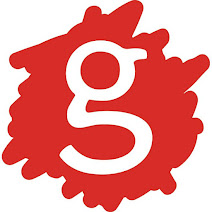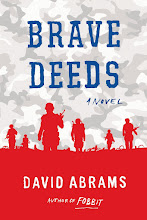My First Time is a regular feature in which writers talk about virgin experiences in their writing and publishing careers, ranging from their first rejection to the moment of holding their first published book in their hands. Today's guest is Craig Lancaster, author of the novels 600 Hours of Edward and The Summer Son. 600 Hours of Edward, Lancaster's debut novel, was a 2009 Montana Honor Book and the 2010 High Plains Book Award winner for best first book. He was born in Washington and raised in Texas. His stepfather, Charles Clines, was a longtime sportswriter at the Fort Worth Star-Telegram, a connection that led to Craig's career as a journalist, a profession he followed to a series of newspaper jobs across the country--Texas, Alaska, Kentucky, Ohio, Washington, California and, finally, Montana. He currently lives in Billings where he works as an editor at The Billings Gazette. Visit his website here.
My First Front Page
In the fall of 1988, I was 18 years old and a few weeks deep into what would prove to be an inglorious college experience, but I had hope: I had just been hired as a correspondent for one of the Fort Worth Star-Telegram’s outlying bureaus, where I’d cover sports and small-city government for the princely sum of $50 per story. (My hope was that I could somehow manage five stories a week and $1,000 a month, which I figured would be all the money I’d ever need. Clearly, I was well suited for the writing life early. No expectation of riches.)
My arrival at the Northeast Tarrant County bureau coincided with a run to the 3A state championship football game by Southlake Carroll, one of the high schools in our coverage area. These days, Carroll is one of the most celebrated football programs in the U.S. and one of the biggest schools in Texas, but 23 years ago, it was a smallish school in a semi-rural area.
The championship game against Navasota would be covered by a staff sports reporter, someone from the main office downtown. But my editor, Jim Fuquay, who’d taken a chance on me despite my age, was able to snag me a small role in the coverage. I would ride down to Waco on a bus chartered by Carroll boosters and parents and then work the stands for a color story on the town’s celebration of the mighty Dragons. Jim told me before I left that he’d stuck his neck out considerably for me: “You’ll be on a tight deadline. The editor downtown is worried you won’t be able to handle it. I assured him you’ll do just fine."
For the first half, I sat with various clumps of Carroll fans and asked questions about the season and their allegiance to the team. I talked to a woman, Sue Harston, who told me that her son-in-law and daughter had both won state titles at Carroll and that another victory would give her a fourth ring in her jewelry box. I fixated on that as a possible hook for the story. At halftime, I filed the bulk of the story on a Radio Shack TRS-80, leaving me only with the considerable task of providing a top and a conclusion at the end of the game.
Carroll won, 42-8, and sure enough, I had about a 15-minute window to get my story completed before deadline. I called the editor in downtown Fort Worth, the one who’d worried that I would fold under the pressure, and dictated a few paragraphs for the top of the story and one for the bottom. The conclusion:
"The magic did prevail. And the fans shared in it--Darrell Russell’s 25-year wait ended and Sue Harston got her fourth ring."
"This is really nice, Craig,” the editor said. “Good job.” I’m not sure I’ve ever received praise from an editor that meant so much as that.
The next morning, I scrambled to find the paper and thumbed through it, looking for my story. It wasn’t on Page 1A; the editors had gone with a color piece by Gil LeBreton, one of the paper’s star columnists. My heart sank as I turned to the sports section and didn’t find it there, either. Dejected, I went back to bed.
It wasn’t until hours later that I heard my mom’s excited voice. “Craig, come look.” I found her in the dining room. There, on Page 1A, sat my story. It was below the fold of the paper, a little three-inch sliver of type in the bottom left-hand corner of the page, but there it was. I’d missed it on the first pass because it was a companion piece to LeBreton’s, with a tiny elliptical headline. In my frantic search through the paper, I’d simply mistaken it for part of LeBreton’s story.
But it wasn’t. It was mine. Seeing it there, on the front page of a city newspaper, knowing what it had taken to write it, I felt incredible pride.
I’ve had similar thrills in this racket in the years since--holding my first novel was a particularly transcendental moment--but none of them have exceeded standing there in my parents’ dining room, holding ink-smudged newsprint and marveling at my name upon a little one-column stick of type. As I write this, that front page sits to my left on my desk, and as I look at it, I’m 18 again, if only for a moment.
My arrival at the Northeast Tarrant County bureau coincided with a run to the 3A state championship football game by Southlake Carroll, one of the high schools in our coverage area. These days, Carroll is one of the most celebrated football programs in the U.S. and one of the biggest schools in Texas, but 23 years ago, it was a smallish school in a semi-rural area.
The championship game against Navasota would be covered by a staff sports reporter, someone from the main office downtown. But my editor, Jim Fuquay, who’d taken a chance on me despite my age, was able to snag me a small role in the coverage. I would ride down to Waco on a bus chartered by Carroll boosters and parents and then work the stands for a color story on the town’s celebration of the mighty Dragons. Jim told me before I left that he’d stuck his neck out considerably for me: “You’ll be on a tight deadline. The editor downtown is worried you won’t be able to handle it. I assured him you’ll do just fine."
For the first half, I sat with various clumps of Carroll fans and asked questions about the season and their allegiance to the team. I talked to a woman, Sue Harston, who told me that her son-in-law and daughter had both won state titles at Carroll and that another victory would give her a fourth ring in her jewelry box. I fixated on that as a possible hook for the story. At halftime, I filed the bulk of the story on a Radio Shack TRS-80, leaving me only with the considerable task of providing a top and a conclusion at the end of the game.
Carroll won, 42-8, and sure enough, I had about a 15-minute window to get my story completed before deadline. I called the editor in downtown Fort Worth, the one who’d worried that I would fold under the pressure, and dictated a few paragraphs for the top of the story and one for the bottom. The conclusion:
"The magic did prevail. And the fans shared in it--Darrell Russell’s 25-year wait ended and Sue Harston got her fourth ring."
"This is really nice, Craig,” the editor said. “Good job.” I’m not sure I’ve ever received praise from an editor that meant so much as that.
The next morning, I scrambled to find the paper and thumbed through it, looking for my story. It wasn’t on Page 1A; the editors had gone with a color piece by Gil LeBreton, one of the paper’s star columnists. My heart sank as I turned to the sports section and didn’t find it there, either. Dejected, I went back to bed.
It wasn’t until hours later that I heard my mom’s excited voice. “Craig, come look.” I found her in the dining room. There, on Page 1A, sat my story. It was below the fold of the paper, a little three-inch sliver of type in the bottom left-hand corner of the page, but there it was. I’d missed it on the first pass because it was a companion piece to LeBreton’s, with a tiny elliptical headline. In my frantic search through the paper, I’d simply mistaken it for part of LeBreton’s story.
But it wasn’t. It was mine. Seeing it there, on the front page of a city newspaper, knowing what it had taken to write it, I felt incredible pride.
I’ve had similar thrills in this racket in the years since--holding my first novel was a particularly transcendental moment--but none of them have exceeded standing there in my parents’ dining room, holding ink-smudged newsprint and marveling at my name upon a little one-column stick of type. As I write this, that front page sits to my left on my desk, and as I look at it, I’m 18 again, if only for a moment.














No comments:
Post a Comment